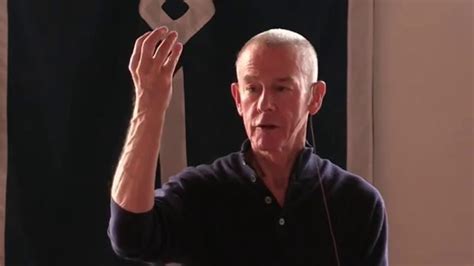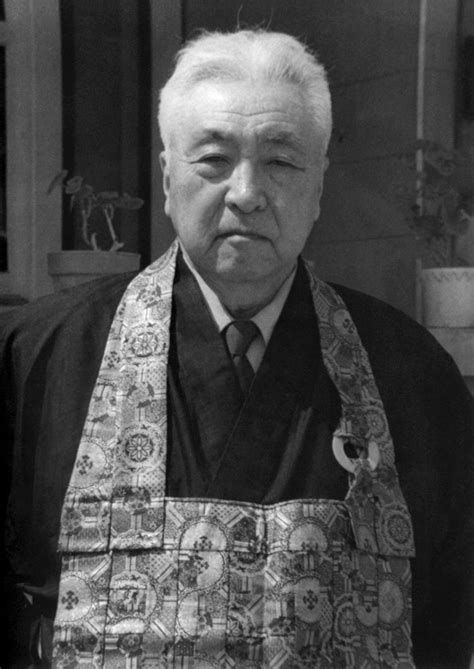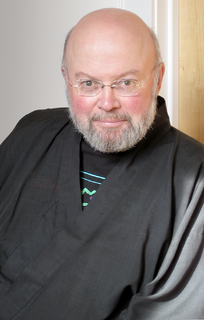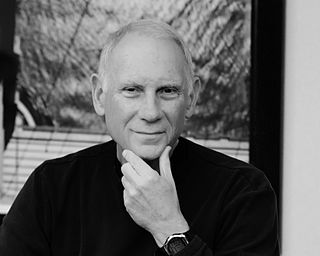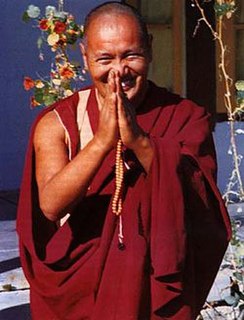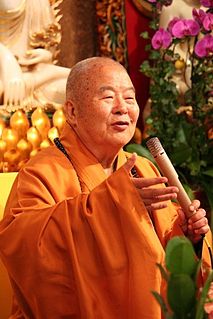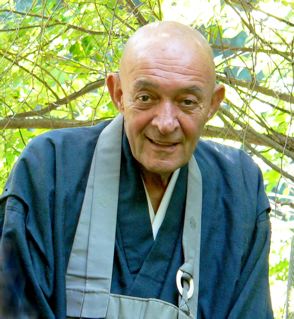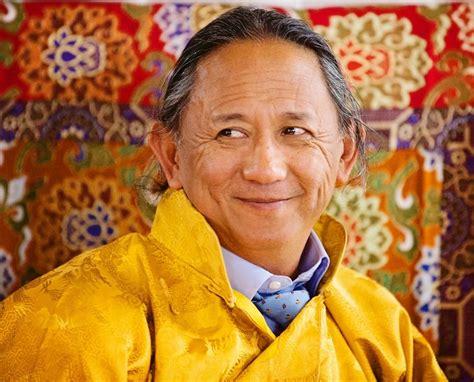Top 237 Dharma Quotes & Sayings - Page 4
Explore popular Dharma quotes.
Last updated on April 19, 2025.
Bearing in his right paw the shovel that digs to the truth beneath appearances, cut the roots of useless attachments, and flings damp sand on the fires of greed and war; His left paw in the Mudra of Comradely Display - indicating that all creatures have the full right to live to their limits and that deer, rabbits, chipmunks, snakes, dandelions, and lizards all grow in the realm of the Dharma.
Regard the heart as a vast field. Use the mind as a plough. Treat the gunas (qualities) as bullocks. Use the intelligence (Viveka) as a whip. With these aids, cultivate the field of your heart. What is the crop that is to be grown in it? Sathya, Dharma, Santhi and Prema are the crops. Bhakthi is the rain, meditation is the manure, Brahmananda is the crop.
Dharma is not about credentials. It's not about how many practices you've done, or how peaceful you can make your mind. It's not about being in a community where you feel safe or enjoying the cachet of being a 'Buddhist.' It's not even about accumulating teachings, empowerments, or 'spiritual accomplishments.' It's about how naked you're willing to be with your own life, and how much you're willing to let go of your masks and your armor and live as a completely exposed, undefended, and open human person.
Dharma gives you the balance. It gives you the establishment into proper behavior, proper understanding, proper living, but it doesn't give you the completion of your journey. It doesn't give you the satisfaction of reaching the destination and your personality is still incomplete. So one has to have the experience of the spirit.
And whatever the form of your own resurrection, you will arise, driven not by the Great Search, but by your own Great Duty, your limitless Dharma, the manifestation of your own highest potentials, and the world will begin to change because of you. And you will never flinch, and you will never fail in that great Duty, and you will never turn away, because simple, ever-present awareness will be with you now and forever, even unto the end of the worlds, because now and forever and endlessly forever, there is only Spirit, only intrinsic awareness of just this, and nothing more.
Pride is a mental factor causing us to feel higher or superior to others. Even our study of dharma can be the occasion for the delusion of pride to arise if we think our understanding is superior to that of everyone else. Pride is harmful because it prevents us from accepting fresh knowledge from a qualified teacher. Just as a pool of water cannot collect on the tip of a mountain, so too a reservoir of understanding cannot be established in a mind falsely elevated by pride.
When a builder builds he clears the ground for his new foundations. Then he sees that the basic structure will support the whole. Should we not also clear the mind - at least that part of it that we can reach - of the ruins of past thinking, before building our palace of dharma which will one day reach the sky.
So long as man is capable of Prema, Dharma will exist, do not doubt it. When that Prema is fixed on the Lord, your mental make-up will slowly and steadily undergo a revolutionary change; then, man will share in the sorrows and joys of his fellow-beings; thereafter he contacts the very source of the Bliss that is beyond the temporary gains and losses of this world.
Dharma Bums refusing to subscribe to the general demand that they consume production and therefore have to work for the privilege of consuming, all that cramp they didn't really want anyway such as refrigerators, TV sets, cars, at least new fancy cars, certain hair oils and deodorants and general junk you finally always see a week later in the garbage anyway, all of them imprisoned in a system of work, produce, consume, work, produce, consume.
The same Divine Compassion that blessed Dharma; saved Gajendra; restored Kuchela; and stood by Prahlada, has come to the Earth as the Refuge of the refugeless; as the Lord of Peace, Harmony and Righteousness; as the Lord of all the Worlds; as the Sath-Chith-Anandamurthi; and as the Puttaparthi Sathya Sai Sath-Chakravarthi - the King of Kings.
All of the external circumstances and the rude and difficult people we meet, instead of getting angry, upset, or frustrated, we see that we can take them all and use them on the path in a way that actually invigorates and strengthens us, rather than defeats us. It's all very practical advice, and that's why I talk a lot about how to make our daily life into Dharma practice, otherwise it's easy to feel hopeless and helpless.
I was born in England and brought up in London. When I was 18 I read a book and came across the Dharma. I was halfway through the book when I turned to my mother and said, "I'm a Buddhist," to which she replied, "Oh are you dear? Well finish the book and then you can tell me about it." I realised I'd always been Buddhist but I just hadn't known it existed, because in those days not even the word 'Buddha' was ever spoken. This was in in the 1960s, so there wasn't that much available, even in London.
Unlike some of my other dharma brothers who got names that were very long and obscure, and nobody could remember or pronounce, that they didn't like. They wanted to give their names back, but it wasn't like that, it wasn't transactional. He would name some people and say 'you're married', and then they were married, but you know it wasn't really transactional.
The individuation of dharma practice occurs whenever priority is given to the resolution of a personal existential dilemma over the need to conform to the doctrines of a Buddhist orthodoxy. Individuation is a process of recovering personal authority through freeing ourselves from the constraints of collectively held belief systems.
The buddha-dharma does not invite us to dabble in abstract notions. Rather, the task it presents us with is to attend to what we actually experience, right in this moment. You don't have to look "over there." You don't have to figure anything out. You don't have to acquire anything. And you don't have to run off to Tibet, or Japan, or anywhere else. You wake up right here. In fact, you can only wake up right here. So you don't have to do the long search, the frantic chase, the painful quest. You're already right where you need to be.
According to this law [the law of Dharma], you have a unique talent and a unique way of expressing it. There is something that you can do better than anyone else in the whole world--and for every unique talent and unique expression of that talent, there are also unique needs. When these needs are matched with the creative expression of your talent, that is the spark that creates affluence. Expressing your talents to fulfill needs creates unlimited wealth and abundance.
A sadhak (one who does spiritual practice) will not have time to indulge in gossip. They will not feel like talking to anyone in a harsh manner. Those who always indulge in faultfinding will never achieve spiritual progress. Do not harm anyone by thoughts, words or deeds. Be compassionate towards all beings. Ahimsa (nonviolence) is the highest dharma (duty).
Shivaji was the greatest Hindu king that India had produced within the last thousand years; one who was the very incarnation of lord Siva, about whom prophecies were given out long before he was born; and his advent was eagerly expected by all the great souls and saints of Maharashtra as the deliverer of the Hindus from the hands of the Mlecchas, and as one who succeeded in the reestablishment of Dharma which had been trampled underfoot by the depredations of the devastating hordes of the Moghals
India of the ages is not dead nor has she spoken her last creative word; she lives and has still something to do for herself and the human peoples. And that which must seek now to awake is not an anglicised oriental people, docile pupil of the West and doomed to repeat the cycle of the occident's success and failure, but still the ancient immemorable Shakti recovering her deepest self, lifting her head higher towards the supreme source of light and strength and turning to discover the complete meaning and a vaster form of her Dharma.
Look what we are trying. You call it dharma, but it is not. What we are trying is to come together; come together to an understanding. The difference is, the discipline is, the commitment is that we are going to come together with the following guiding lines: 'May the long time sun shine upon you, all love surround you, and the pure light within you guide your way on.' When we came together we decided we would guide our way on. My way and your way we already know, so we do not need to learn that. Each one of you knows 'my' way and 'your' way. All we have to learn is 'our' way."
Those who read books cannot understand the teachings and, what's more, may even go astray. But those who try to observe the things going on in the mind, and always take that which is true in their own minds as their standard, never get muddled. They are able to comprehend suffering, and ultimately will understand Dharma. Then, they will understand the books they read.
For the dharma to become firsthand knowledge-to feel the ‘ouch’ of it-you have to live intimately with it, hold it up to scrutiny, and let it hold you up to scrutiny. In the end, the ball is always thrown back to you: ‘Be a lamp unto yourself,’ says the Buddha. In other words, you must ultimately find the way on your own, by putting your ideas of the truth to the test. Your questions light the way.
Better than a thousand hollow words Is one word that brings peace. Better than a thousand hollow verses Is one verse that brings peace. Better than a hundred hollow lines Is one line of the dharma, bringing peace. It is better to conquer yourself Than to win a thousand battles. Then the victory is yours. It cannot be taken from you, Not by angels or by demons, Heaven or hell.
Followers of the Way [of Chán], if you want to get the kind of understanding that accords with the Dharma, never be misled by others. Whether you're facing inward or facing outward, whatever you meet up with, just kill it! If you meet a buddha, kill the buddha. If you meet a patriarch, kill the patriarch. If you meet an arhat, kill the arhat. If you meet your parents, kill your parents. If you meet your kinfolk, kill your kinfolk. Then for the first time you will gain emancipation, will not be entangled with things, will pass freely anywhere you wish to go.
I know that I came into the world with what I call 'big dharma' - with a blueprint to teach self-reliance and a positive loving approach to large numbers of people all over the globe. I am ever so grateful for the circumstances of my life that allowed me to be pretty much left alone and to develop as I was so intended in this incarnation.
Hinduism... gave itself no name, because it set itself no sectarian limits; it claimed no universal adhesion, asserted no sole infallible dogma, set up no single narrow path or gate of salvation; it was less a creed or cult than a continuously enlarging tradition of the Godward endeavour of the human spirit. An immense many-sided many-staged provision for a spiritual self-building and self-finding, it had some right to speak of itself by the only name it knew, the eternal religion, Sanatana Dharma.
It is my greatest joy to share with students this knowledge that I have acquired in the past 50 years of practice and study. Dharma Yoga practice will give one’s body the power and strength to have resistance to common illnesses and diseases. With proper encouragement and increased faith in the Guru, as one can improve his physical body and mental attitude rapidly, thereby igniting the higher motives of making one's self useful to himself and all mankind.
To think that practice and realization are not one is a heretical view. In the Buddha Dharma, practice and realization are identical. Because one's present practice is practice in realization, one's initial negotiating of the Way in itself is the whole of original realization. Thus, even while directed to practice, one is told not to anticipate a realization apart from practice, because practice points directly to original realization.
When one has a decisive realization of the inherent nature of the mind, which has no ego, it has no sense of duality between oneself and the cup, and a deep sense of interpenetration of the whole dharma. Then whatever we do is spontaneously perfect Buddha activity. And anybody who is even slightly tuned in will get a very deep experience of that.
Lord Krishna... proclaims Self-realization, true wisdom, as the highest branch of all human knowledge-the king of all sciences, the very essence of dharma ("religion")-for it alone permanently uproots the cause of man's threefold suffering and reveals to him his true nature of Bliss. Self-realization is yoga or "oneness" with truth-the direct perception or experience of truth by the all-knowing intuitive faculty of the soul.
Having no background in philosophic thought and ignorant of the reasons supporting their faith, they experience great uneasiness when someone questions their beliefs. Such people often live closely guarded lives, fearful of encountering someone or something that might shatter their insecure spiritual foundation.This attitude, however, is not the fault of religion but of their own limited understanding. True Dharma leads in exactly the opposite direction. It enables one to integrate all the many diverse experiences of life into a meaningful and coherent whole, thereby banishing fear and insecurity completely.
Tolerance is a form of generosity and it is a form of wisdom. There is nothing anywhere in the Dharma [Buddhist scriptures] that should ever lead anyone to become intolerant. Our goal as Buddhists is to learn to accept all kinds of people and to help all kinds of people discover the wisdom of the teachings of Shakyamuni Buddha
Thich Nhat Hanh has the ability to express some of the most profound teachings of interdependence and emptiness I've ever heard. With the eloquence of a poet, he holds up a sheet of paper and teaches us that the rain cloud and the tree and the logger who cut the tree down are all there in the paper. He's been one of the most significant carriers of the lamp of the dharma to the West that we have had.
In transmitting the dharma, there is neither explanation nor teaching; there is neighter hearing nor attainment. Since explanations never really explains, nor are they able to teach, why talk about it? Since listening isn't really hearing or attaining anything, then why listen? But say, since it cannot be explained or heard, how can you enter the Way? But down the bagagge, take of the blinders, and see for yourself that this very place is the valley of the endless spring, this very body is the body of the universe. At such a time, who is it who can accompany this?
Therefore, be islands unto yourselves. Be your own refuge. Have recourse to none else for refuge. Hold fast to the Dharma as a refuge. Resort to no other refuge. Whosoever, either now or after I am gone, shall be islands unto themselves, shall seek no eternal refuge, it is they, among my disciples who shall reach the very topmost height! But they must be keen to progress.
Today people live to work rather than work for a living. They have forgotten their true goal in life. Subsequently they have forgotten their dharma. There is no communication between hearts, there is no sharing. Having lost contact with other's hearts, we become totally isolated. But in truth we are not isolated islands, we are links that form one chain.






